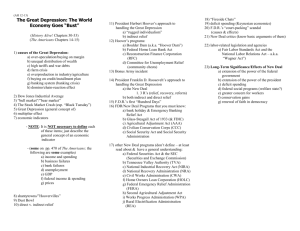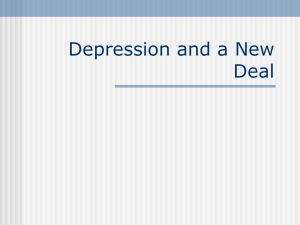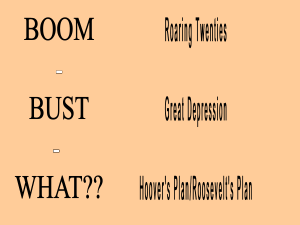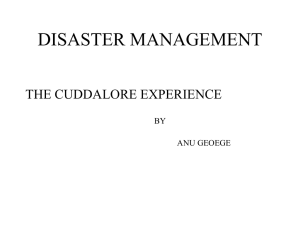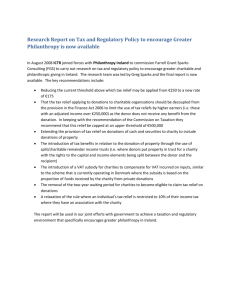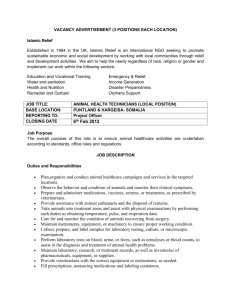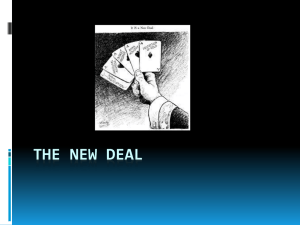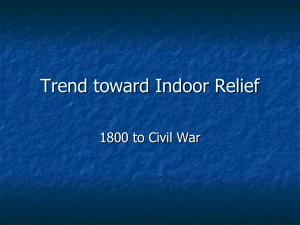The Great Depression: Hardship and Survival, 1930-1933
advertisement
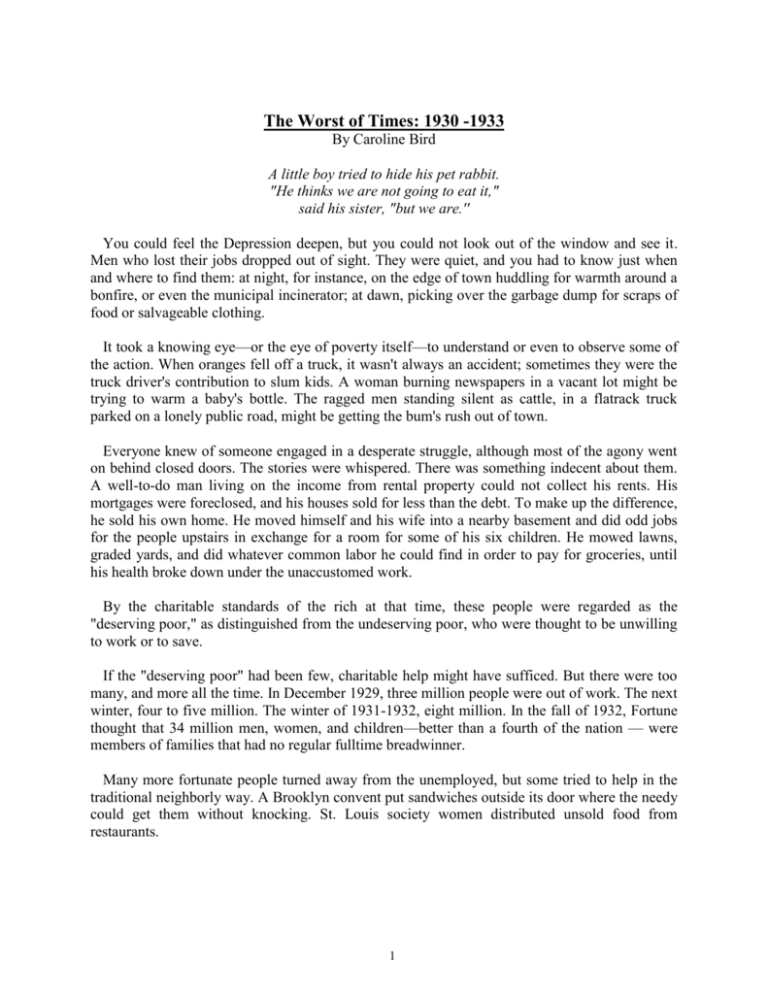
The Worst of Times: 1930 -1933 By Caroline Bird A little boy tried to hide his pet rabbit. "He thinks we are not going to eat it," said his sister, "but we are.'' You could feel the Depression deepen, but you could not look out of the window and see it. Men who lost their jobs dropped out of sight. They were quiet, and you had to know just when and where to find them: at night, for instance, on the edge of town huddling for warmth around a bonfire, or even the municipal incinerator; at dawn, picking over the garbage dump for scraps of food or salvageable clothing. It took a knowing eye—or the eye of poverty itself—to understand or even to observe some of the action. When oranges fell off a truck, it wasn't always an accident; sometimes they were the truck driver's contribution to slum kids. A woman burning newspapers in a vacant lot might be trying to warm a baby's bottle. The ragged men standing silent as cattle, in a flatrack truck parked on a lonely public road, might be getting the bum's rush out of town. Everyone knew of someone engaged in a desperate struggle, although most of the agony went on behind closed doors. The stories were whispered. There was something indecent about them. A well-to-do man living on the income from rental property could not collect his rents. His mortgages were foreclosed, and his houses sold for less than the debt. To make up the difference, he sold his own home. He moved himself and his wife into a nearby basement and did odd jobs for the people upstairs in exchange for a room for some of his six children. He mowed lawns, graded yards, and did whatever common labor he could find in order to pay for groceries, until his health broke down under the unaccustomed work. By the charitable standards of the rich at that time, these people were regarded as the "deserving poor," as distinguished from the undeserving poor, who were thought to be unwilling to work or to save. If the "deserving poor" had been few, charitable help might have sufficed. But there were too many, and more all the time. In December 1929, three million people were out of work. The next winter, four to five million. The winter of 1931-1932, eight million. In the fall of 1932, Fortune thought that 34 million men, women, and children—better than a fourth of the nation — were members of families that had no regular fulltime breadwinner. Many more fortunate people turned away from the unemployed, but some tried to help in the traditional neighborly way. A Brooklyn convent put sandwiches outside its door where the needy could get them without knocking. St. Louis society women distributed unsold food from restaurants. 1 But there was more talk than help. A great many people spent a great deal of energy urging each other to give, to share, to hire. President Hoover led a national publicity campaign to urge people to give locally and to make jobs. Results of such appeals were disappointing. Corporation executives answered the pleas by saying that they had no right to spend stockholders’ money hiring men they did not need. The well of private charity ran dry. A Westchester woman is said to have fired all her servants in order to have money to contribute to the unemployed. "Voluntary conscription" of wages helped steelworkers weather the first round of layoffs in little Conshohocken, Pennsylvania, but the plan broke down as there were more mouths to feed and fewer pay envelopes to conscript. Local charities everywhere were overwhelmed by 1931, and the worst was yet to come. Kentucky coal miners suffered perhaps the most. In Harlan County there were whole towns whose people had not a cent of income. They lived on dandelions and blackberries. Dysentery bloated the stomachs of starving babies. Children were reported so famished they were chewing up their own hands. Miners tried to plant vegetables, but they were often so hungry that they ate them before they were ripe. On her first trip to the mountains, Eleanor Roosevelt saw a little boy trying to hide his pet rabbit. "He thinks we are not going to eat it," his sister told her, "but we are." No national charity existed to relieve mass poverty. The American Red Cross was big and efficient, but it had been set up to mobilize outside help for "a temporary condition brought about by some uncontrollable act or acts." Chairman John Barton Payne contended that unemployment was not an "Act of God." If not controllable by the unemployed themselves, and he believed it was, it was the result of some Act of Man and so out of bounds for the Red Cross. But the police could not keep hungry people out of the Red Cross warehouse in Hazard, Kentucky. A Quaker himself, Hoover went to the American Friends Service Committee. The Philadelphia Meeting developed a "concern" for the miners. Hoover gave them $2,500 out of his own pocket, but most of the contributions seem to have come from the Rockefellers. "No one has starved," Hoover boasted. To prove it, he announced a decline in the death rate. It was heartening, but puzzling, too. Even the social workers could not see how the unemployed kept body and soul together, and the more they studied, the more the wonder grew. Savings, if any, went first. Then insurance was cashed. Then people borrowed from family and friends. They stopped paying rent. When evicted, they moved in with relatives. They ran up bills. It was surprising how much credit could be wangled. But in the end they had to eat "tight." Every serious dieter knows how little food it takes to keep alive. One woman borrowed 50¢, bought stale bread at 3 1/2¢ a loaf, and kept her family alive on it for 11 days. When eating tight, the poor thought of nothing but food, just food. They hunted food like alley cats, and in some of the same places. They haunted docks where spoiled vegetables might be thrown out and brought them home to cook up in a stew from which every member of the family would eat as little as possible, and only when very hungry. Children would hang around grocery stores, begging a little food, running errands, or watching carts in exchange for a piece of fruit. Enough people 2 discovered that a five cent candy bar can make a lunch to boom sales during the generally slow year of 1931. You get used to hunger. After the first few days it doesn't even hurt; you just get weak. When work opened up, at one point, in the Pittsburgh steelmills, men who were called back were not strong enough to do it. A teacher in a mountain school told a little girl who looked sick but said she was hungry to go home and eat something. "I can't," the youngster said. "It's my sister's turn to eat." In Chicago, teachers were ordered to ask what a child had had to eat before punishing him. The police saw more than anyone else. They had to find help for people who fell sick in the streets or tried to commit suicide. And it was to a cop that city people went when they were at the end of their rope and did not know what else to do. In New York City, the police took a census of needy families, and city employees started contributing one percent of their salaries to a fund for the police to use to buy food for the people they found actually starving. It was the first public confession of official responsibility for plain poverty, and it came not from the top, but from the lowest-paid civil servants, who worked down where the poor people were. Teachers worried about the children who came to school to get warm. They organized help for youngsters who needed food and clothing before they could learn. Sometimes Boards of Education diverted school funds to feed them. Often the teachers did it on their own. Chicago teachers fed 11,000 pupils out of their own pockets in 1931, although they had not themselves been paid for months. Official recognition of need, and even Hoover's appeals to private local charity, raised questions of principle in the minds of those in a position to think of poverty and unemployment in the abstract. "You make a bad mistake in talking about the unemployed” a businessman told the mayor of Youngstown when he tried to raise a bond issue to finance city relief. "Don't emphasize hard times, and everything will be all right." Businessmen feared that the talk was bad for business. They did not like to think of hard times. Without first-hand experience, it was easy to stick to the traditional view that it was a man's own fault if he was poor, that a man ought to take care of his own family and lay aside something for a rainy day. The suspicion persisted that most of the poor were not really "deserving" of charity, that they were better off now than they had ever been. Men of old-fashioned principles really believed that public relief was bad for the poor because it discouraged them from looking for work or from taking it at wages that would tempt business to start up again. According to their theory, permanent mass unemployment was impossible, because there was work at some wage for every able-bodied man, if he would only find and do it. Charity was necessary, of course, for those who were really disabled through no fault of their own, but there could never be very many of these, and they should be screened carefully and given help of a kind and in a way that would keep them from asking for it as long as possible. Respectable folk worried about the idea of public relief, even though accepting the need for it. On opinion polls they agreed with the general proposition that public relief should be temporary, hard to get, and less than the lowest wage offered by any employer. 3 It was a scandal when a relief client drove an old jalopy up to the commissary to lug his groceries home. In some places, a client had to surrender his license plates in order to get relief, even if the old car meant a chance to earn small sums to pay for necessities not covered by relief. Phones went, too, even when they were a relief client's only lifeline to odd jobs. The search for hidden assets was thorough. One thrifty family in New York was denied relief "because it does not seem possible for this family to have managed without some other kind of assistance." Almost everybody thought relief caused the poor to become irresponsible and to have children they could not support if, in fact, they did not have babies deliberately in order to qualify. If some way could have been found to prevent married couples on relief from indulging in sexual intercourse, there would have been those who would have demanded it. People who took public relief were denied civil rights. Some state constitutions disqualified relief clients from voting, and as late as 1938 an opinion poll showed that one out of every three Republicans thought this was right. In some places, village taxpayers' organizations tried to keep the children of tax delinquents out of the local schools. People suspected of taking public relief were even turned away from churches. During the first and worst years of the Depression, the only public relief was improvised by cities. Appropriations were deliberately low. If funds ran out every few months, so much the better. The poor would have to make another effort to find work. Every program was "temporary." In most cases, this was sheer necessity. Cities could not afford otherwise. Their tax bases were too narrow. Some of them had lost tax money when banks folded. State governments were not prepared to help. No state even had a Department of Welfare until Governor Franklin D. Roosevelt organized one for New York State in 1929. Cities begged for temporary loans. Bankers were generally reluctant, because cities did not have tax resources from which to pay back the money. Still, Hoover kept insisting, no one starved. In May 1932, Hoover's Secretary of the Interior, Dr. Ray Lyman Wilbur, reassured the National Conference of Social Workers meeting in Philadelphia. "With prosperity many parents unload the responsibilities for their children onto others. With adversity the home takes its normal place. The interest of thousands of keen and well-trained people throughout the whole country in seeing that our children are properly fed and cared for has given many of them better and more suitable food than in past good times." Social workers were indignant. "Have you ever seen the uncontrolled trembling of parents who have starved themselves for weeks so that their children might not go hungry?" social worker Lillian Wald demanded. Others told how fathers and even older brothers and sisters hung around street corners while the younger children were being fed, for fear they would be tempted to eat more than their share. Eviction was so common that children in a Philadelphia daycare center made a game of it. They would pile all the doll furniture up first in one corner and then in another. "We ain't got no money for the rent, so we's moved into a new house," a tot explained to the teacher. Public opinion favored the tenant. An eviction could bring on a neighborhood riot. 4 Landlords often let the rent go. Some of them needed relief as much as their tenants, and had a harder time qualifying for it. In Philadelphia a little girl whose father was on relief could not get milk at school, under a program for needy children, because her father "owned property." Investigators found some unemployed tenants sharing food orders with their landlords. It was not true that "no one starved." People starved to death, and not only in Harlan County, Kentucky. The New York City Welfare Council counted 29 deaths from starvation in 1933. An additional 110, most of them children, died of malnutrition. Medical care for the poor was sketchy. Doctors were hard hit financially, and they did not always live up to the Oath of Hippocrates. Frequently, the poor were afraid to call a doctor because they did not have money. New York City surgeons sometimes demanded cash in advance or delayed operations until the family could get money together. The harder the middle class looked, the more critical poverty seemed. It did not seem possible that people could stand lack of regular food, unstable homes, medical neglect. The Depression did not depress the conditions of the poor. It merely publicized them. The poor survived because they knew how to be poor. The Milbank Foundation found more sickness among the poor than among the well off, but they also found that the newly poor were sicker more often than those who always had been poor. A family eating tight would stay in bed a lot. That way they would save fuel, as well as the extra food calories needed in cold weather. The experienced poor, particularly the blacks, knew about eating the parts of the animal normally rejected. A family with no money for the gas company would economize by cooking once a week. When it was cut off, they would cook in the furnace. They gathered scrap wood to keep the furnace going. They saved by heating only the kitchen. When fuel was low, the experienced poor would sneak into a movie house. 5
